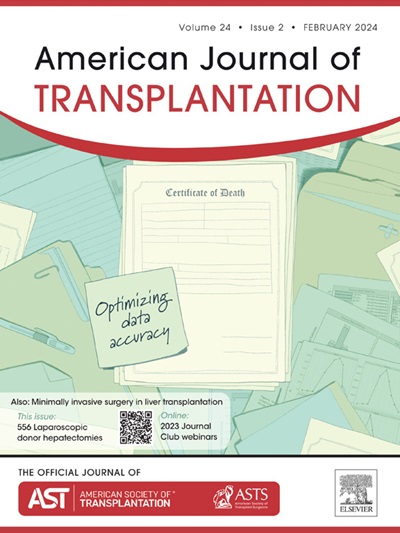FK506以依赖mdsc的方式延长异体角膜移植存活并阻止树突状细胞浸润。
IF 8.2
2区 医学
Q1 SURGERY
引用次数: 0
摘要
FK506(又名他克莫司)是移植术后应用最广泛的免疫抑制药物之一。迄今为止,FK506抑制免疫激活和延长同种异体移植物存活的细胞机制仍不清楚。在这里,我们采用小鼠模型角膜穿透角膜移植术来询问这个关键问题。FK506可增加受体小鼠骨髓源性抑制细胞(MDSC)的扩增,延长角膜异体移植物的存活时间。相反,抗体介导的MDSC缺失消除了fk506介导的有益作用,这与树突状细胞(DC)激活和移植物床和同种异体移植物的募集增加有关。值得注意的是,与持续耗竭和暂时性早期耗竭(在第一周)不同,移植后第8天开始的MDSC延迟耗竭未能破坏fk506诱导的角膜异体移植存活的延长。单细胞RNA测序分析和角膜移植物的免疫荧光染色显示,FK506以mdsc依赖性和时间性的方式减少DC和T细胞等免疫细胞的移植物浸润。此外,MDSC的耗尽在第7天恢复了FK506对引流淋巴结DC成熟的抑制。综上所述,这些发现表明FK506通过诱导mdsc介导的早期DC激活抑制来延长同种异体移植物的存活。本文章由计算机程序翻译,如有差异,请以英文原文为准。
Tacrolimus prolongs corneal allograft survival and prevents dendritic cell infiltration in a myeloid-derived suppressor cell–dependent manner
Tacrolimus (also known as FK506) is one of the most widely used immunosuppressive drugs in the postsurgery management of transplantation. To date, the cellular mechanism by which FK506 suppresses immune activation and elongates allograft survival remains largely unclear. Here, we employed a mouse model for corneal penetrating keratoplasty to interrogate this critical question. Administration of FK506 led to increased expansion myeloid-derived suppressor cells (MDSC) in recipient mice and prolonged survival of corneal allografts. In contrast, antibody-mediated depletion of MDSC abolished the FK506-mediated beneficial effects, which are associated with increased dendritic cell (DC) activation and recruitment to the graft bed and allografts. Of note, unlike continuous depletion and temporary early depletion (in the first week), delayed depletion of MDSC that started on day 8 posttransplant failed to disrupt the FK506-induced elongation of corneal allograft survival. Single-cell RNA sequencing analysis and immunofluorescence staining of corneal grafts reveal that FK506 reduced graft infiltration of immune cells, including DC and T cells, in an MDSC-dependent and temporal fashion. Moreover, depletion of MDSC reverted the FK506’s suppression of DC maturation in the draining lymph node on day 7. Taken together, these findings indicate that FK506 prolongs allograft survival through induction of MDSC-mediated suppression of early DC activation.
求助全文
通过发布文献求助,成功后即可免费获取论文全文。
去求助
来源期刊
CiteScore
18.70
自引率
4.50%
发文量
346
审稿时长
26 days
期刊介绍:
The American Journal of Transplantation is a leading journal in the field of transplantation. It serves as a forum for debate and reassessment, an agent of change, and a major platform for promoting understanding, improving results, and advancing science. Published monthly, it provides an essential resource for researchers and clinicians worldwide.
The journal publishes original articles, case reports, invited reviews, letters to the editor, critical reviews, news features, consensus documents, and guidelines over 12 issues a year. It covers all major subject areas in transplantation, including thoracic (heart, lung), abdominal (kidney, liver, pancreas, islets), tissue and stem cell transplantation, organ and tissue donation and preservation, tissue injury, repair, inflammation, and aging, histocompatibility, drugs and pharmacology, graft survival, and prevention of graft dysfunction and failure. It also explores ethical and social issues in the field.

 求助内容:
求助内容: 应助结果提醒方式:
应助结果提醒方式:


